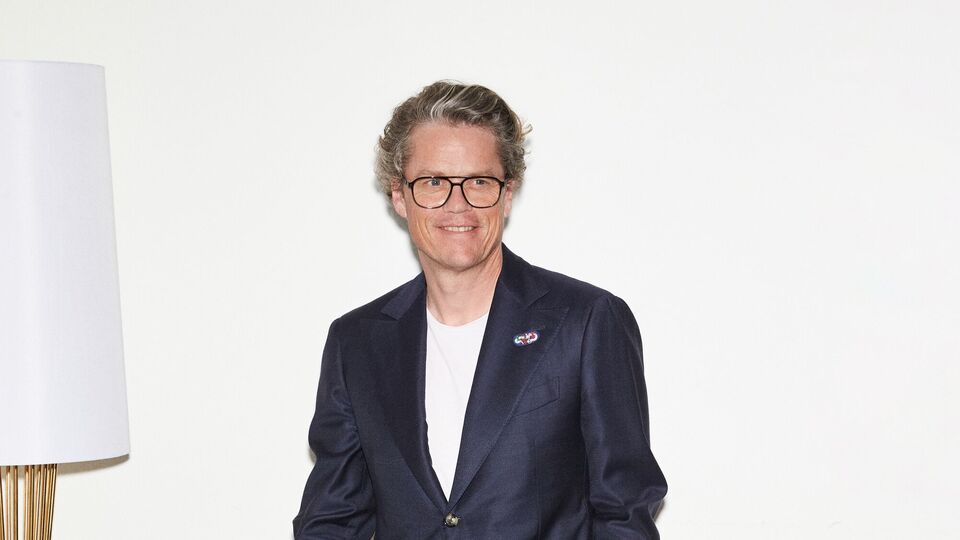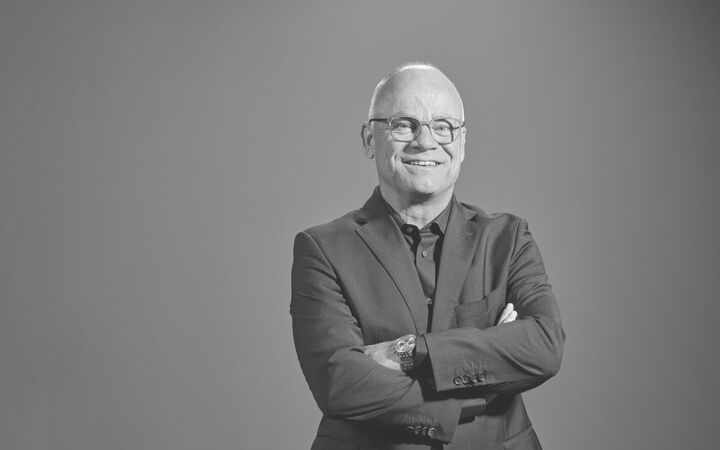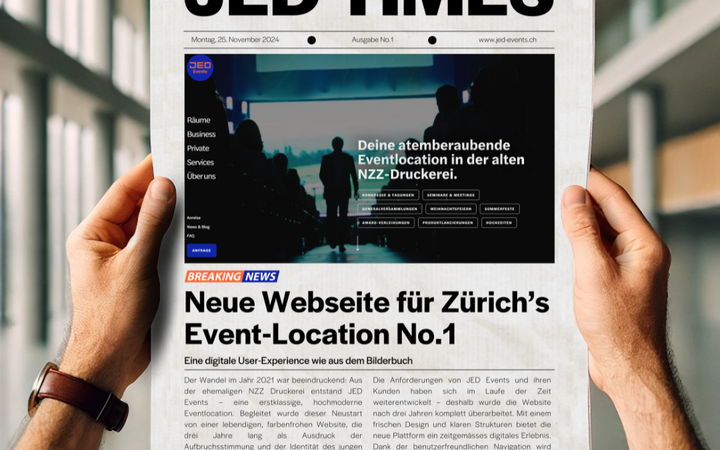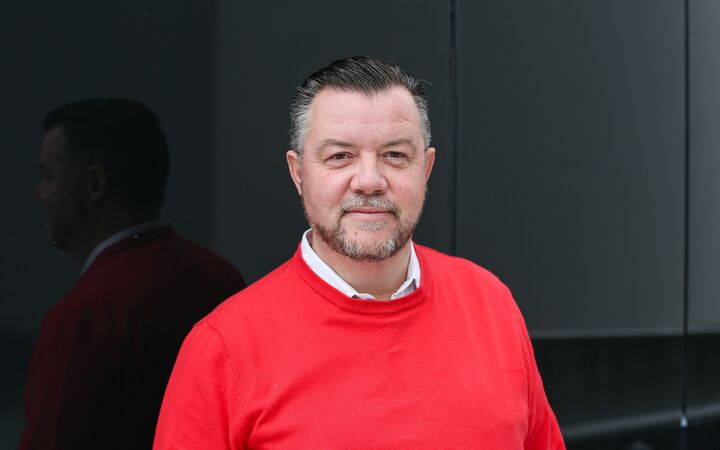Maximilian Souchay is a visionary in the Swiss event industry and a storyteller whose experiences are as multifaceted as the events he stages. As the founder of Live Lab, he pursues a clear purpose: live is the most powerful form of communication - it connects people and creates lasting experiences.
With an unerring instinct for creativity and staging, he is shaping the world of live communication. Today, we meet a man who is convinced that enthusiasm always spills over from person to person. How does someone who transforms emotions into light, sound and experiences think? What drives him and how does he always stay ahead? We wanted to find out - with a twinkle in his eye, a lot of curiosity and at a place he knows very well: JED Events.
Max, before we go into depth - do you remember your very first event? What went wrong and what drew you to it back then?
My very first professional event was for a car dealership in Berlin. The event took place in the old Postfuhramt and the dealership's various customers were invited. After the event, all the suppliers came to collect their things and the room was suddenly empty. Then my boss came up to me and asked: "And now?" I replied: "Now we're going to celebrate." He then said, "Um, I think you forgot to order a dry cleaner." Instead of celebrating, I spent the next two hours sweeping the location clean and picking it up wet. Since then, I've known that dismantling is just as important as the rest of the event.
You studied marketing in Bern and cultural management and acting in Liverpool - how did it come about that you chose the event industry over the big theater stage?
During my studies in Bern, I co-initiated and organized the art project "Triebjagd" together with two friends in addition to parties. I realized that I wanted to work more with art and creativity and that I really enjoy events. It was at this time that the Liverpool Institute for Performing Arts was founded under the patronage of Paul McCartney. That sounded exactly like what I was looking for - I could study cultural management in the English sense and minor in drama there.
What was the moment when you knew: "I want to found Live Lab"? Was there an "aha" moment or a night of doubt?
When I started my own business in 2008 with "Souchay Consulting", I had a great time and was able to do lots of exciting things. But I quickly realized that I wasn't a lone fighter and wanted to have a long-term structure around me that would allow me to work in a team. When an opportunity arose around the WEF, we founded Live Lab.
Live communication in a digital world - how do you manage to inspire people offline when everything is increasingly taking place online?
Corona has shown that there is a great need to meet offline. I would even go so far as to say that live communication will be the big winner in the communication mix of the future. In times of exploding screen time, people long for encounters and experiences - whether in a professional or private environment.
When you are planning an event, what is the most important moment? The big bang, the subtle details or the applause at the end?
The guests or participants have to feel comfortable and safe - only then can I inspire them with a big bang or even several "little bangs". Attention to detail is crucial and increases enthusiasm.
How do you deal with customers who want great things but don't have a concrete idea? Is there an anecdote that has made you smile in particular?
If we realize that a client can't formulate exactly what they want to achieve, we usually suggest a workshop. We develop the briefing together. Beforehand, we conduct interviews with the most important stakeholders to get an initial picture.
You are known for bringing stories to life at events - which event was the most emotional for you and why?
I've been doing events for over 20 years now, and it's hard to say which one was the most emotional. For me, the most emotional moments are when I see our concept come to life and work. When the dramaturgy touches people and triggers something. One particularly memorable example was a show celebrating "50 years of Swiss music" with a super band and various Swiss performers - a "money can't buy" moment.
Imagine you had to stage an event completely without technology - what would you do to inspire the guests anyway?
Out into nature! Who doesn't know them - the happy faces after a long hike and the shining eyes in the glow of the fire? People used to sit around the campfire together, tell stories, play music, eat together and have a good time. That's exactly what I would like to build on.
Is there a technology or trend that makes you say: "This will completely change the event industry in the next few years"?
Of course, AI will have a big impact on the event industry. However, my conclusion is that events will become more important. According to the WEF, one of the biggest dangers of AI is deep fakes. These can be prevented by events, as they provide first-hand information - live and real.
Max, you are a co-initiator of the Shape Festival. What drives you to see sustainability not just as a concept, but as an obligation?
With the Shape Festival, which is now called Shape.Cities, we wanted to create an event platform where people can discuss the topic of sustainability with joy and ease. Unfortunately, the topic has become less of a priority in the business world, and there is also a certain fatigue among consumers. Nevertheless, we are sticking to our concept and I am convinced that the right time will come to put it into practice. It remains a project close to my heart that I would like to realize one day.
How do you really manage to implement sustainability at a huge corporate event with high energy consumption?
At the WEF, we replaced the tent construction with pellet heating with an efficient timber construction that only required minimal electricity heating - and even that was hardly used. These are the big levers that make sustainability tangible.
But it's not just the big measures that count. Small ideas also play their part. For one customer, we only use living plants for event design, which are replanted after the event. For another client, we collect old Christmas trees that would otherwise be disposed of and reuse them for decorative purposes - a creative solution with a double benefit.
And then we even started our own project: As a small offsetting measure, we started growing potatoes in Davos two years ago. The potatoes are now sold in organic food stores under the name "Ünschi", and we've even made our own potato chips from them. Now we are expanding the project to include our own water. Whether big or small - every idea brings us closer to our goal.
You can find out more here: www.uenschi.ch
Are there any sustainable ideas that you really want to try out but haven't had the chance to yet?
At the WEF, we have a dome tent in use, which we would like to replace with a wooden pavilion - a step that could further promote sustainability.
We also had the idea of a sustainable funding program for a large retailer: a platform where people can submit their projects, which are then financially supported. This could have created many small stories around the topic of sustainability. Unfortunately, we weren't able to get the customer excited enough about it, and it would have been quite costly to implement. Nevertheless, I still hold on to ideas like this - they have the potential to bring about real change.
What's the first thing you do when a big event is over? A cold beer, a long bath or straight onto the next project?
In my time at Rufener Events, we used to go out after every event. That's changed a bit as I've got older (laughs). But toasting together, celebrating success - be it with a cold beer or a nice glass of red wine - is still part of it for me. And every now and then we also go out on the town.
If you weren't an event manager, what would you be doing today? Actor? Or maybe a chef?
We believe that "live is the strongest form of communication". The encounter, i.e. the "live", is my passion. My job is to stage and dramatize them. For me, the job title "event manager" is actually too short, as we do much more than just events at Live Lab.
But to come back to your question: I am fascinated by medicine, especially surgery.
Is there a typical "Maximilian Souchay trick" that you use at events to achieve the "wow effect"?
Of course, I'm not going to reveal the "Maximilian Souchay trick" here (laughs).
But we are always coming up with new approaches that we then implement successfully. Live Lab used to share an office with Projektil, so we learned a lot about projection mapping and used it a lot. Or then we worked intensively on "experience-oriented networking" and successfully implemented this concept.
Tell us about a situation in which everything went wrong during an event - and how did you turn things around?
Last year, we had an employee event with around 1500 guests where we had planned the checkroom incorrectly - it was far too small and confusing. When the guests arrived with up to three items to hand in, stress broke out. The hostesses put the bags and jackets somewhere and chaos was inevitable. In the end, we mobilized all available Live Lab employees on site and took over the checkroom without further ado. That way we were able to cushion the onslaught and resolve the confusion. After the stress, we chalked the whole thing up to a great team experience and learned from it: from now on, every checkroom will be perfectly planned.
You survived the pandemic as an event agency. What was the biggest challenge for you, and how has this time changed you?
I'm basically a person who always looks ahead and doesn't bury my head in the sand. The biggest challenge was thinking about what the industry would look like after the pandemic: Will there still be events at all, or will everything just be virtual? During this time, we bought a small film production company to better cover virtual event needs. That was one of the best decisions, even though it later turned out that although virtual events have not remained, the topic of content has become more important.
Where do you see Live Lab in five years' time? And what do you wish for the event industry as a whole?
First of all, I am grateful that we are where we are now. Of course, we will continue to develop - be it through geographical expansion, healthy growth in Switzerland - there are still a few clients I would like to work for - or the expansion of our offering.
If you could organize an event for yourself, without budget limits - what would it look like? What would the motto be?
I always tell our clients: "Give me a budget, otherwise I can't be creative." (laughs)
What do you want your audience to take away from every event? Is there a message that drives you?
Live Lab primarily organizes corporate events. I want to tell our clients that it is a privilege when their audience spends time with them. Our job is to make this time as enjoyable as possible, and our clients' job is to make the most of it. Because an event is only a good event if it also brings (customer) success.
Bonus question: Max, you know JED Events well - what makes this location special for you as an event professional, and which event would you realize there immediately if you had a free hand?
I like the JED because it's plug & play. Thanks to the beautiful but not playful architecture, it needs little decoration. In addition, the in-house catering ensures that guests are well catered for quickly. The JED management has a very good understanding of events, so nothing stands in the way of a smooth process. In principle, I would organize many events there.



